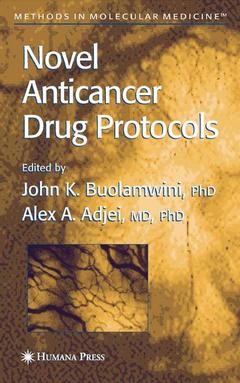Description
Novel Anticancer Drug Protocols, Softcover reprint of the original 1st ed. 2003
Methods in Molecular Medicine Series, Vol. 85
Language: English
Novel Anticancer Drug Protocols
355 p. · 15.2x22.9 cm · Paperback
355 p. · 15.2x22.9 cm · Paperback
Novel anticancer drug protocols (Methods in molecular medicine, Vol. 85)
Publication date: 03-2003
355 p. · 15.5x23.5 cm · Hardback
Publication date: 03-2003
355 p. · 15.5x23.5 cm · Hardback
Description
/li>Contents
/li>Comment
/li>
We are in an exciting era in the war against cancer, with real prospects for novel anticancer drugs that are cancer cell-specific without the toxicities that have been the hallmark of conventional cytotoxic cancer chemotherapy. Advances in cancer cell biology fueled by the molecular biology revolution have resulted in the uncovering of many novel potential molecular targets for cancer therapy. New anticancer drug discovery and development is now largely focused on exploiting these new molecular targets, which encompass oncogenes, tumor s- pressor genes, and their gene products, as well as targets involved in tumor angiogenesis, metastasis, survival, and longevity mechanisms. Exploitation of some of these targets has already yielded fruits and introduced new paradigms of molecularly targeted cancer therapy into the clinic, namely, protein kinase in- bition by antibodies or small molecules, exemplified by Herceptin® (trastuzumab), a humanized antibody targeted against the HER-2 growth factor receptor tyrosine kinase for the treatment of metastatic breast cancer; and Gleevec, a small molecule bcr-abl kinase inhibitor for the treatment of chronic myel- enous leukemia.
Overview of Novel Anticancer Drug Targets.- Kinase Inhibitor Discovery Protocols.- Biomarker Assays for Phosphorylated MAP Kinase.- Assays for Cyclin-Dependent Kinase Inhibitors.- Identifying Inhibitors of ATM and ATR Kinase Activities.- Angiogenesis and Metastasis Protocols.- The Rat Aortic Ring Assay for In Vitro Study of Angiogenesis.- Real Time In Vivo Quantitation of Tumor Angiogenesis.- Use of Tumor-Activated Hepatic Stellate Cell as a Target for the Preclinical Testing of Anti-Angiogenic Drugs Against Hepatic Tumor Development.- Cell Motility, Adhesion, Homing, and Migration Assays in the Studies of Tyrosine Kinases.- Inflammatory Response of Tumor-Activated Hepatic Sinusoidal Endothelium as a Target for the Screening of Metastasis Chemopreventive Drugs.- Binding Assay for Selectins.- Determination of Peak Serum Levels and Immune Response to the Humanized Anti-Ganglioside Antibody-Interleukin-2 Immunocytokine.- Immunohistochemical Assays in the Clinical Setting.- Immunohistochemical Determination of EGFR-Tyrosine Kinase Inhibition in Clinical Samples.- Immunohistochemical Assays of Farnesyltransferase Inhibition in Patient Samples.- Protein Chaperoning/Degradation Protocols.- Assays for HSP90 and Inhibitors.- Assays for Proteasome Inhibition.- Protein-Protein and Protein-DNA Interactions.- The Mammalian Two-Hybrid Assay for Detection of Coactivator-Nuclear Receptor Interactions.- Preparation of DNA-Protein Complexes Suitable for Spectroscopic Analysis.- Antisense.- Antisense Oligonucleotide Inhibitors of MDM2 Oncogene Expression.- Genomics.- Pharmacogenetic Analysis of Clinically Relevant Genetic Polymorphisms.- Gene Expression Microarrays.- Methods for Isolation and Genetic Analysis of Circulating Tumor DNA in Patient Plasma.- Cell Lifespan/Longevity.- The Use of Early Sea Urchin Embryos in Anticancer Drug Testing.- In Vivo Imaging.- PET Screening of Anticancer Drugs.- Miscellaneous Protocols.- Assays for In Vitro and In Vivo Synergy.- Flow Cytometric Methods for Detection and Quantification of Apoptosis.- Assays for Neoplastic Cell Enrichment in Bone Marrow Samples.
Includes supplementary material: sn.pub/extras
© 2024 LAVOISIER S.A.S.
These books may interest you

Small Molecules in Oncology 126.59 €

Small Molecules in Oncology 105.49 €


